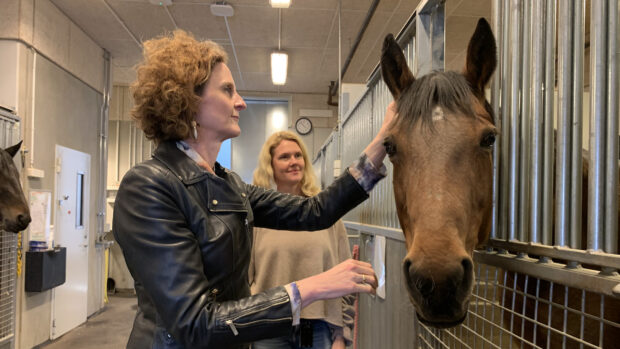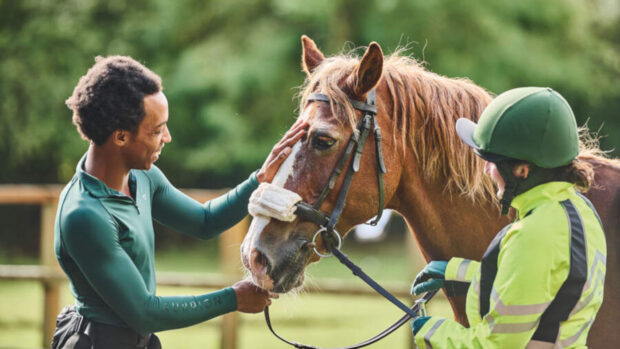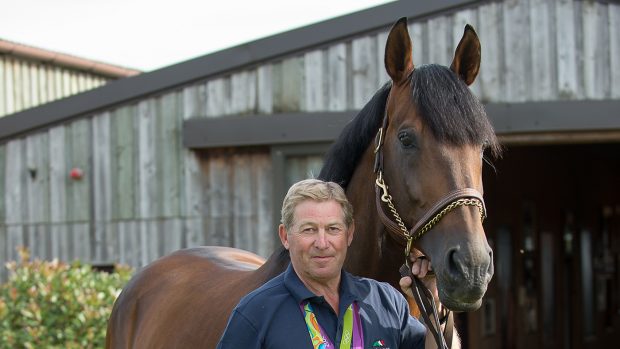IF efforts being made to support riders’ mental health can save even one person’s life, it will be worth everything.
Support service Riders Minds released a documentary on World Suicide Prevention Day, on 10 September, almost seven months after co-founder Matthew Wright took his own life.
Presented by journalist Lizzie Greenwood-Hughes, the film included an interview with Matthew’s wife Victoria, who set up Riders Minds with her husband.
“Whenever anyone’s saying they’re going to take their own life, or it becomes normal living with someone with a mental illness, don’t ever think they’re not going to do it,” Victoria said.
She had told Lizzie she had met Matthew through horses, how her husband was a great father to their three children, who had achieved so much in eventing. She said he might have appeared tough but was insecure, taking comments to heart, and that he had attempted to take his own life several times.
“We’d got help for him and he improved for a couple of years,” Victoria said, adding that before his death, Matthew seemed “probably the happiest he’d ever been”.
“Whether he’d planned it and had decided the time was right, I don’t know,” she said. “He sent me a message that morning that said ‘Today is the perfect day’. I look back now and think, the perfect day for what?”
Matthew spent the morning with the children on Valentine’s Day, then cooked Victoria dinner. She said he seemed normal, if reminiscing about good times, when she put the children to bed.
“I read them a story, then flicked on Facebook, all normal things you do. I came back upstairs and he was dead. He was dead. I found him, and you kick yourself; why was I on my phone, why did I not go upstairs 10 minutes earlier. I could have stopped him.”
Victoria said telling her children Daddy had died was the hardest thing she had ever done, and probably will ever do.
She explained how Matthew’s blogs on HorseandHound.co.uk, in which he was very open about his mental health, had led to many other riders’ getting in touch to relate similar stories. The British Grooms Association (BGA) then asked him to write a similar blog, and Matthew, seeing the Grooms Minds and Employers Minds services provided by the BGA, proposed a similar resource for riders.
“He was really passionate that there should be a Riders Minds,” Victoria said. A meeting with the BGA followed and Riders Minds was set up.
“We set it up and funded the start of it, because the equestrian world needed this service,” she said. “We’re adding services, so there are more things there to help people.”
Matthew’s best friend Matthew Heath, another top eventer, said the phone call about Matthew’s death was “one I won’t forget”.
He said professional riders are lucky enough to do their hobby for a living, but that while the riding itself is “the best job in the world”, the added pressure of its being a career, and “everything that goes with it”, is tough.
“I think it’s massively important to have a system riders can turn to, anonymously,” he added. “That’s really important because most of us are quite arrogant and don’t want to be seen as weak. The fact there’s someone there on the phone, and the awareness they’re doing on social media to make people realise it’s ok to come forward.”
Clinical psychologist Duncan Law, who works with the Injured Jockeys Fund, said studies have shown almost twice as many people within racing suffer from mental health issues than the general population.
Asked why riders may be more susceptible, he said: “That’s a really important question, but a hard one.”
He added that the industry is a tough one, and a “losing one”; even stellar successes like AP McCoy have lost more times than they have won.
“The earlier we can get to people, the better we can do,” he said. “But also to start the conversation, at the start of their careers, so mental health is on the agenda. It’s a good thing for you to do, but also for your career.”
Equestrian influencer Kate Lewis, who shared her mental health issues online — she was bullied at school, then home-schooled – had reached a point where she was having “nasty thoughts about doing things to myself”. She called her GP, received the help she needed, and is now a “different person”.
“It’s nice to realise it’s possible to get to the other side,” she said. “I’d encourage anyone else to do the same as me; speak to someone and start that journey because you never know where you are in that dark tunnel; you could just have one corner left till you see the light.”
Riders Minds director Sylvia Bruce, a former very successful banker who had tried to take her own life more than once, also went to her GP and has since been “transformed”.
She said horses had always been her therapy, as did Lizzie, who asked whether, for equestrian professionals, the fact horses are not then an escape has an impact.
“I think there is an element of that,” Sylvia said. “Even when something is your passion, there’s a balance, and a tipping point, where it can go into something else and loses the passion.”
Sylvia added that she wishes Matthew could see how well Riders Minds has done, “and the fact we’re still pushing forwards for him”.
“I want Riders Minds to be the go-to for all equestrians,” she said. “If we can stop one person doing what Matthew did, then wow.”
You might also be interested in:

Thousands donated to mental health support in Matthew Wright’s memory
The service is available to all those who ride and love horses

‘Something Matt would be proud of’: Riders Minds launches new support in Mental Health Awareness Week
During 2021 Mental Health Awareness Week (10-16 May) plans for a new vital resource to help riders get more support

Personal trainer’s solo marathon effort in memory of lost riders
Katie was inspired to raise money for mental health charity Riders’ Minds, and the IJF (who have recently launched an

‘No one should suffer in silence’: eventers discuss their mental health to urge others to speak up
‘It’s so easy to look normal on the outside, but be dying inside’

British breeding comes together to support mental health in Matthew Wright’s memory
Matthew, who was open about his mental health struggles, died last month, and was well known in breeding circles as
Horse & Hound magazine, out every Thursday, is packed with all the latest news and reports, as well as interviews, specials, nostalgia, vet and training advice. Find how you can enjoy the magazine delivered to your door every week, plus options to upgrade your subscription to access our online service that brings you breaking news and reports as well as other benefits.





